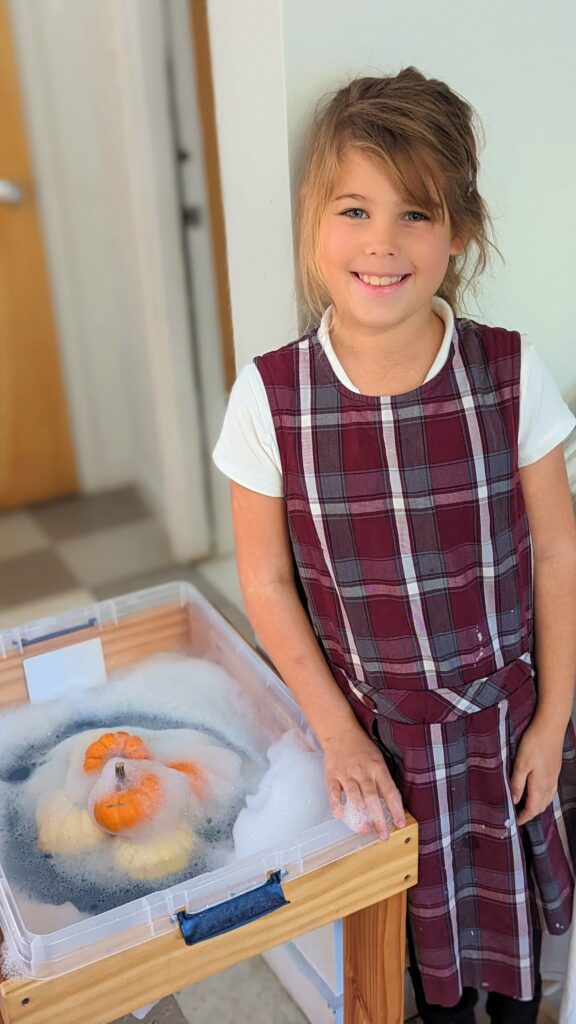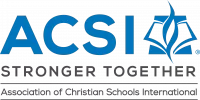Grades 1-3
Nurturing & Preserving Your Child's Love of Learning
Young children love learning, with an intrinsic motivation that is a joy to observe. Our goal in the lower grades at Hampden Christian is to nurture and preserve this love of learning so they can enter the middle grades with their drive to learn intact.
Throughout the subjects, students desire to learn is nurtured as they encounter their subjects in engaging ways; multi-sensory learning, hands-on projects, stories from “living” books, and encounters with the community outside the school in frequent field trips and service-learning projects.
As they grow, our most important concern is that students are growing in their love for God and in bedrock character traits. As well, students at this age are developing important 21st-century skills such as adaptability and a growth mindset that will help to carry them through the rest of school and life.

Curriculum Overview
Students are given a rich exposure to the Bible throughout early elementary. Our teachers make Bible stories interesting and compelling through pictures, songs, plays, and narratives. Our Bible memorization program builds neural plasticity, exercises the brain, and expands Scriptural knowledge. Additionally, class discussions and assignments shape character, enabling our students to become community builders who love God and serve others.
Reading, listening, and comprehending are an integral part of academic success. Because our students are given a strong foundation in phonemic awareness and phonics, they spell and read with fluency. Significant time is spent in reading and listening; students enjoy quality literature. They build vocabulary skills through a rich selection of books across the subjects. Students listen attentively, ask insightful questions, and make connections with life experiences.
Manuscript writing is taught primarily in kindergarten and first grade. In second grade, students transition to cursive handwriting, a unique art form that stimulates the brain and increases syntax skills. Word and sentence formation are modeled, and incremental instruction teaches writing proficiency. Students begin expressing themselves through writing as they are given research projects and engaging writing assignments. Speaking skills are taught through oral reading exercises, pronunciation and enunciation practice, and classroom discussions. Additionally, all students participate in public speaking through Show & Tell, Christmas concerts, and science and history fair presentations.
Our students encounter events that have shaped the world and connect with historical characters. They consider how history has affected their lives and influences their decisions. Our teachers strive to present history with accuracy and objectivity, allowing students to form convictions and conclusions, while acknowledging God’s work in the world. Learning is brought to life through drama, stories, photographs, history fairs, and trips. Our k-3 curriculum includes World History and American History.
Our library contains thousands of delightful books which include fantasy, poetry, biographies, picture books, and child-friendly informational resources. Children are given the opportunity to browse and explore and experience the wonder of books. Our librarian carefully selects recommended reading for each week, reads aloud from these selections, and provides activities for the children. Additionally, students are encouraged to pursue their individual interests and spend time reading alone. We invite parents to visit our library and interact with our dedicated librarian.
Our students are encouraged to be creative and expressive, and art class develops these traits. Our art teacher broadens each child’s horizon by introducing a variety of artforms and materials. Students investigate two- and three-dimensional projects and become better artists. Classes include drawing, painting, sculpting, and designing. Discussion and collaboration foster curiosity and wonder, drawing children toward shared enjoyment of beauty.
Both teachers and students get excited about science. In the lower grades, experiments, books, and questions fuel curiosity and wonder. Students engage with nature. They learn to make predictions, investigate problems, and report discoveries. Science fairs and multiple field trips enhance learning. Students research topics of interest and present information they have acquired. We introduce various scientific fields: environmental science, biology, astronomy, physical science, technology, and chemistry.
We choose to work with physical materials, complete hands-on projects, and read many books instead of employing electronic media and technology for three reasons: First, we believe that learning happens best in relationship with teachers and classmates. Secondly, healthy children imagine and question and explore the real world around them, and immersion in a virtual world hinders that exploration. Finally, media exposure can affect nerve networks in a child’s brain, hindering focus, memory, and eye tracking. Educational videos, mostly limited to occasional short clips, are previewed by teachers and discussed in class to support learning goals.
In grades K-3, our students use multisensory activities, hands-on projects, and manipulatives to explore measurements, shapes, and numerical ideas. Demonstrations, songs, chants, and interactive exercises teach basic computational skills and help students develop mathematical thinking. Incremental learning and systematic practice build a strong foundation for future learning. Our students recognize that mathematics is a language useful for solving problems and understanding the world around them.
As part of our emphasis on the arts, students are given a strong foundation in music. They sing daily and learn to enjoy hymns, folk songs, choruses, and echo singing. Students are introduced to basic elements of music: rhythm, melody, harmony, form, and timbre. They learn to listen carefully, sing on pitch, keep rhythm, and appreciate good music. The Christmas Concert and End-of-School Program showcase skills accumulated throughout the year.
Our three outdoor recesses every day improve attitude, memory, and concentration, helping students focus in class. In grades K-3, children develop gross motor skills. They learn sportsmanship, teamwork, and coordination. All students participate in group games, basic exercises, and track. In addition, we promote imaginative free play.


